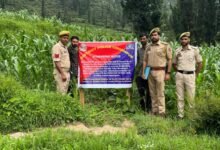CSC report suggests restructuring select quotas in J&K Report identifies categories under UT’s legislative domain; Law Department vetting underway RBA, ALC among categories under review

Srinagar, June : There is likely to be a shift in Jammu and Kashmir’s job reservation policy, as a Cabinet Sub-Committee’s report, recently tabled before the J&K Council of Ministers has proposed realignment of select reservation categories in order to widen the scope for open merit candidates.
The report has since been forwarded to the Union Territory’s Law Department for legal vetting.
Sources from the elected government, privy to the development told Rising Kashmir that the sub-committee, set up by the elected government following widespread protests by open merit aspirants has identified several categories that fall within the legislative and administrative competence of the Union Territory government which include the Residents of Backward Area (RBA), Residents of Areas adjoining Actual Line of Control (ALC), Pahari Speaking People (PSP), and portions of the Economically Weaker Sections (EWS) quota implemented under UT laws.
“These categories were not legislated by Parliament but were created or modified under the Jammu and Kashmir Reservation Act, 2004 and its subsequent amendments, which remain in force under Section 96 of the J&K Reorganisation Act, 2019. This gives the elected UT government the legislative and executive competence to rationalize or revise such categories,” a senior legal expert familiar with the matter told Rising Kashmir.
The report, after being presented to the Cabinet, was sent to the Law Department for detailed legal scrutiny with no official timeline been committed for when it will return to the Cabinet for further action.
“There is legal space for the government to restructure these categories. But the final recommendations will depend on how the Law Department interprets past legal precedents, the J&K Reorganization Act, and applicable constitutional provisions,” sources said.
Among the categories under review, RBA has emerged as a central focus, with sources said, it may face calibrated reductions. This is because a large number of individuals earlier benefiting from RBA quotas have now qualified for ST reservations, after Parliament enhanced their benefits in recent years.
“The overlap between RBA and ST beneficiaries has created a scenario where the same communities are gaining from two categories, reducing space for open merit,” they said. “By trimming RBA, which is under the UT’s purview, the government hopes to partially correct this imbalance.”
However, any reductions, sources said, would be carried out in a manner that protects vulnerable communities and maintains equitable access.
The reservation issue resurfaced as a politically sensitive subject last year after a wave of protests by open merit aspirants across Kashmir and Jammu. Protesters alleged that open category candidates were being left with only a small fraction of available jobs after the reservation quotas were applied, creating a perception of shrinking opportunity for merit-based selection.
The sub-committee was asked to submit a report within six months. However, with the submission already completed and the matter now under legal scrutiny, the government may act sooner depending on the Law Department’s clearance.
The legal analyst further said that J&K’s elected government cannot alter quotas that were codified under central laws or approved by Parliament, such as SC and ST reservations. However, under the J&K Reservation Act (as amended post-reorganization) and applicable executive orders, it retains discretion to amend, curtail, or reclassify quotas that were created or modified through local legislation or government orders.
“The Constitution allows UTs with legislatures to make provisions for advancement of socially and educationally backward classes through their own laws, unless explicitly barred,” he said adding, “In this case, the categories being considered for revision are not protected by Parliamentary mandate and are thus modifiable.”





